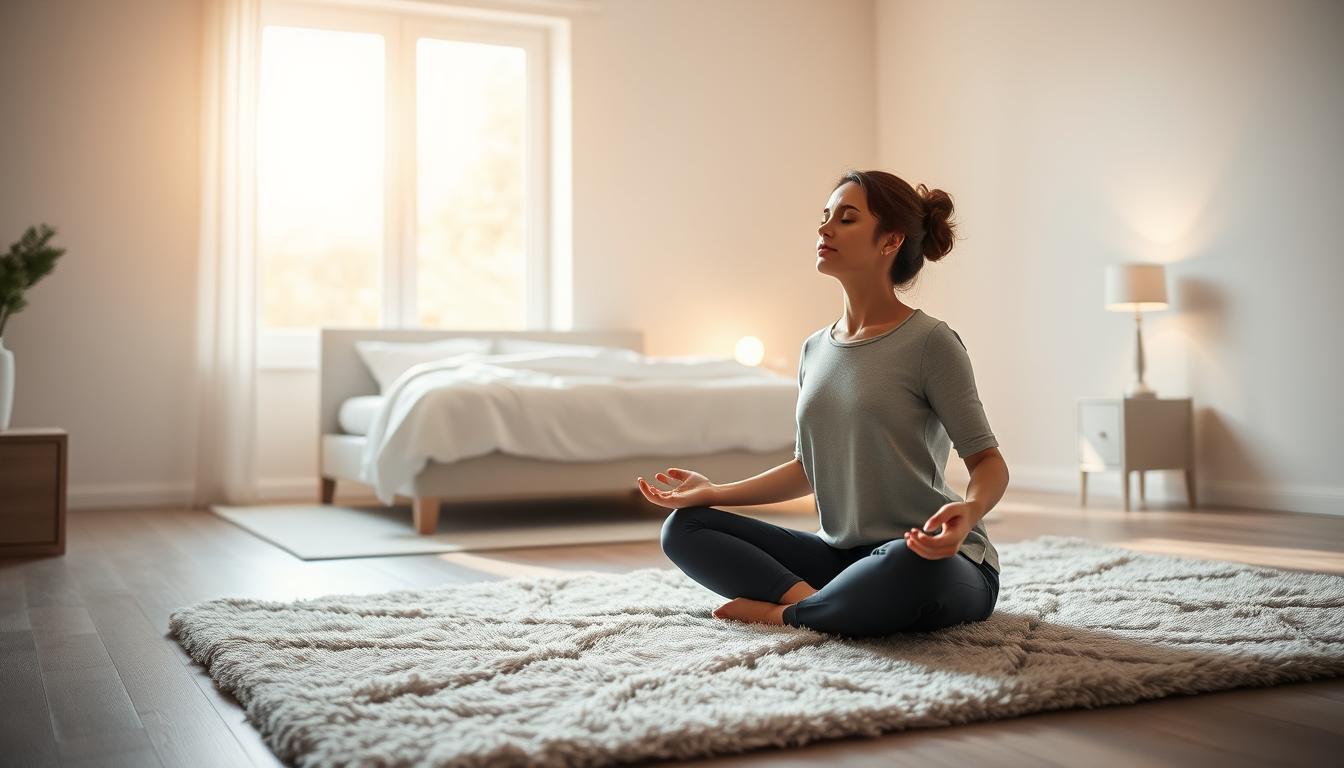Are you having trouble sleeping well at night? What if the key to a good night’s sleep was in your breathing? Using breathing techniques for sleep can change your sleep experience. It offers a natural way to get deeper, more restful sleep.
Sleep breathing exercises are more than just a trend. They are a powerful way to improve your sleep quality. They calm your mind and prepare your body for relaxation. Your breathing patterns affect how fast you fall asleep and how deeply you rest.
Learning how breathing affects sleep can open up new possibilities. It can help those with insomnia, restlessness, or anxiety at night. Simple breathing techniques can quiet your mind, reduce stress, and tell your body it’s time to relax.
Key Takeaways
- Breathing techniques can significantly impact sleep quality
- Proper respiratory patterns promote faster sleep onset
- Stress reduction through breathing can improve overall rest
- Natural breathing exercises are accessible to everyone
- Consistent practice leads to better sleep habits
Struggling night after night? Discover the simple tongue technique that helps you fall asleep in minutes.
Watch this video now.
Understanding the Science Behind Sleep Breathing
Sleep is a complex process that involves our brain, body, and breathing. The sleep-wake cycle controls how we breathe at night. It affects our rest and quality of sleep.

Our bodies change a lot during sleep. Breathing patterns change too, from light to deep sleep. These changes help our bodies repair and stay healthy.
Respiratory Rhythms and Sleep Quality
Breathing affects how well we sleep. Oxygen and sleep quality are closely linked. Smooth breathing means better sleep. But irregular breathing can make us tired during the day.
Balancing Oxygen and Carbon Dioxide
We need a balance of oxygen and carbon dioxide while sleeping. Proper breathing gives our cells the oxygen they need and removes carbon dioxide. This balance is key for deep, uninterrupted sleep and health.
Knowing these science basics can help us improve our sleep and daily life. It’s all about creating the right sleep environment and breathing techniques.
Breathing for Sleep: Essential Techniques for Relaxation

Learning effective breathing techniques can greatly improve your sleep. Deep breathing is more than a simple act. It’s a powerful way to calm your mind and get your body ready for sleep.
Ready to finally get rest? Click to access the Breathing For Sleep program and start calming your mind tonight.
Diaphragmatic breathing is a key technique for better sleep. It involves breathing deeply into your belly, using your diaphragm. Start by placing one hand on your chest and another on your stomach. Inhale slowly through your nose, letting your belly rise while keeping your chest steady.
The 4-7-8 breathing method is also great for relaxation before sleep. It helps slow down your thoughts and calm your nervous system. Breathe in for 4 seconds, hold for 7 seconds, and then exhale for 8 seconds. Do this cycle three to four times, feeling your body relax.
Box breathing is another structured method to manage stress and sleep. Picture breathing in a square: inhale for 4 counts, hold for 4 counts, exhale for 4 counts, and pause for 4 counts. This pattern helps calm your mind and reset your breathing.
Try out these breathing techniques to see what works best for you. Remember, the more you practice, the better your body will get at associating these patterns with sleep.
Common Nighttime Breathing Disorders and Solutions
Breathing is key to good sleep. Many face breathing issues at night that harm their health. Knowing about these problems helps people improve their sleep and breathing.
Sleep Apnea and Its Impact
Sleep apnea can be dangerous but often goes unnoticed. It causes breathing stops during sleep, leading to low oxygen levels. Symptoms include loud snoring, tiredness, and headaches in the morning.
If left untreated, sleep apnea raises the risk of heart disease and diabetes.
Mouth Breathing vs. Nasal Breathing
Mouth breathing can cause more than just discomfort. It can lead to dry mouth, dental problems, and less oxygen. Nasal breathing, on the other hand, filters air better, boosts nitric oxide, and improves sleep.
Natural Remedies for Better Breathing
There are natural ways to tackle breathing issues at night. Breathing exercises, nasal strips, and a healthy weight can help. A good sleep environment and avoiding alcohol before bed also aid in better breathing.
Creating the Perfect Breathing Environment for Sleep
Making your sleep space the best is key for healthy breathing and better sleep. The air you breathe at night affects your rest and recovery. Air quality for sleep includes many factors that can greatly change your breathing and comfort at night.
Humidity and sleep are very connected. The right moisture in your bedroom helps prevent breathing problems and makes breathing easier. Experts say to keep humidity between 30% and 50% for the best sleep. A good humidifier can help keep these levels right, even when it’s dry outside.
Temperature is also very important. Cooler rooms help you breathe better and sleep more soundly. Try to keep your bedroom between 60-67 degrees Fahrenheit for the best comfort. Breathable bedding materials like cotton and moisture-wicking fabrics can also make your sleep space better.
Think about getting an air purifier to get rid of allergens, dust, and other things that can bother your breathing. These devices can really improve the air quality in your sleep space, making it easier to breathe at night. Hypoallergenic pillows and mattress covers add extra protection against things that might bother you.
Small changes in your sleep area can make a big difference in how well you breathe and sleep. By making your space clean, comfy, and well-controlled, you’ll get better rest and feel more refreshed every night.
Conclusion
Proper sleep breathing changes more than just your sleep. It affects your whole health and mind. Learning to breathe right can make you feel better and more alive.
Starting to sleep better is easy with small steps. Change how you breathe, make your sleep space perfect, and use breathing exercises. Each breath helps you relax and sleep better.
Experts say breathing is key to good sleep. Using your nose, avoiding breathing problems at night, and keeping your breathing calm can make a big difference. These habits help you sleep longer and better, making you more alert and focused during the day.
Intentional breathing can change your sleep for the better. Your body can heal and rest well if you breathe right. Try these tips tonight and see how breathing can improve your sleep.





